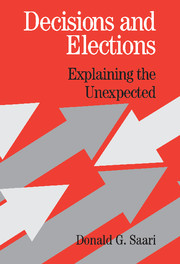5 - More Perversities
Published online by Cambridge University Press: 21 May 2010
Summary
It is this dismissal of valuable but available information, this loss of connections, which makes the area of economics so rich in problematic examples. What makes these peculiarities from economics particularly frustrating is that, as with the Arrow and Sen assertions, it could be that the needed information is explicitly assumed or provided. But, it may be that relevant data is not being used to determine final outcomes and conclusions. Instead, economic procedures may ignore crucial aspects of the information.
As a slight digression, let me mention a positive development. Although the “parts-whole” conflict is not mentioned, the field of economics is addressing some of these difficulties. In the late 1960s, an economist from the University of Minnesota, Leonid Hurwicz, raised questions about the various economic solution concepts. To roughly paraphrase his more precise technical comments, “OK, these are nice notions, but are they any good? If these concepts truly model economic environments, then how do people find the solutions? Presumably, individuals find the price equilibrium, or other economic concepts, by interacting. But, how? Who says what to whom?”
This search for the “Who does what? Who says what to whom?” connecting information gives birth to a wide range of notions. It is the origin of the “mechanism design” literature where the goal is to specify the interactions needed to achieve a specified purpose. The design, for instance, might involve appropriate incentives to make the system self-policing; people do what they are supposed to do primarily because it is in their best interest.
- Type
- Chapter
- Information
- Decisions and ElectionsExplaining the Unexpected, pp. 139 - 156Publisher: Cambridge University PressPrint publication year: 2001



